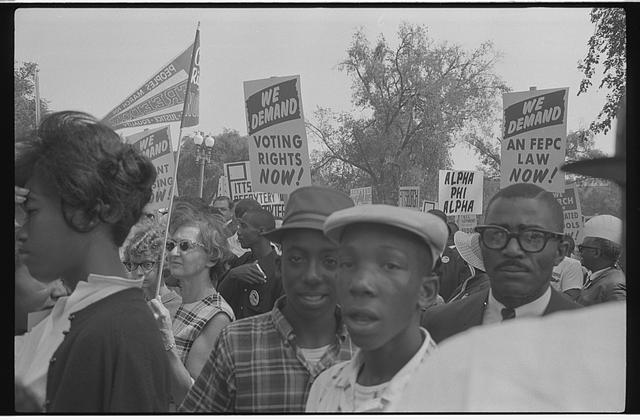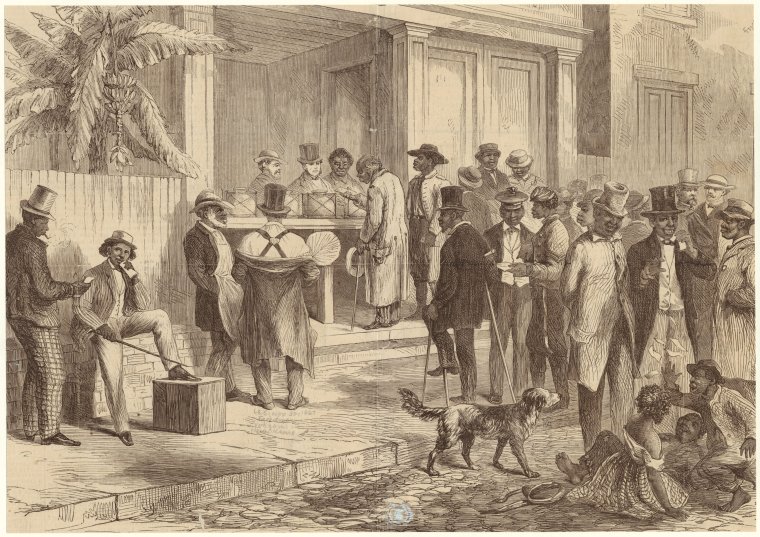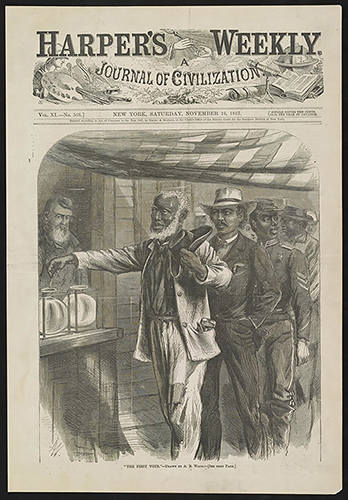Voting rights have long been a contentious issue in this country for Black-Americans. While the Reconstruction Era gave the newly freed slaves citizenship, equal protection, and the right to vote; it also gave way to extreme voter suppression tactics. By the 20th century many states had implemented measures that disproportionately impacted Black-Americans.
It wouldn’t be until the 1960’s that voting would be recognized as a fundamental right that was implicitly guaranteed by the U.S. Constitution.

Understanding the evolution of Black-American voting rights requires a history lesson that few may consider, but nonetheless, heavily impacted the political landscape of today. This difficulty is perhaps best understood by examining the politics of the time that led to many ideologies that prevented basic civil rights and equal protections under the law for Black-Americans as well as the events that led to the eventual laws that solidified Black-Americans right to vote.
March on Washington, 1963 (Library of Congress)
A Country Divided
After the Civil War, America was deeply divided. Ending the enslavement of Black people was a harsh economic blow to the plantation-dependent South. Coupled with economic disaster and this looming idea that the newly freed slaves would ravage and murder whites if given e add; this widespread sentiment gave way to multiple segregationist ideologies. One of the biggest geographic divides were the Jim Crow laws in the South. As a result of these laws, voter turnout among black voters drastically decreased. While there were many attempts made to dismantle Jim Crow in the late 19th century; the control that white Democrats had in congress during this time, successfully prevented any progressive civil rights laws from being put in the books.

The Civil Rights Act of 1875 was an example of this. Unfortunately in 1883, the Supreme Court ruled the law unconstitutional. This would be the last civil rights law enacted until 1957.
Political Factions
Political factions have long been the great unifier and great divider in this country. They have great leverage and influence to exert power that reach far beyond the enumerated powers of the president or of those set forth by The Constitution. Before the Civil War, the Radical Republicans, a faction who set out to abolish slavery, were the driving force behind the Republican Party for a little more than two decades (1854-1877). The Radicals ideology was heavily rooted in the religious belief that slavery was evil. They avidly supported the eradication of slavery, reconstructionism, and pushed forth plans that gave way to the Reconstruction Acts.
The Radicals maintained general control over Congress after the 1866 election, which again, saw the passage of the Civil Rights Act of 1866 and four Reconstruction Acts that would have otherwise been vetoed by President Andrew Johnson, a confederate sympathizer and former slave-owner himself, whom they staunchly opposed.

shown speaking with newspaper editor Horace Greeley,
who supported African American suffrage.
After the Civil War, another political faction, the Redeemers, heavily influenced the political landscape of the time. The Redeemers were a part of the southern wing of the Democratic Party that promoted laissez-faire economics, conservatism, and upheld white supremacy(1870-1910). During the Reconstruction Era, many believed these ideologies had been jeopardized and their way of life threatened. With the occupation of Southern governments by Republicans, the threat to the old Southern way of life became even more real as Republicans continued to push for civil rights for the newly freed slaves. Educated blacks also moved South to work for Reconstruction and were able to achieve political power as ex-slaves exercised their newly obtained rights and elected people in office who not only looked like them, but would understand their plight.
As such, many white Southerners refused to accept this new way of life and coalesced to form insurgent and violent organizations such as the Ku Klux Klan.
Compromise
The presidential election of 1876 between Republican, Rutherford B. Hayes, and Democrat, Samuel J. Tilden was one of the most contentious elections in American history. Once all of the votes had been counted, Tilden had one more electoral vote than Hayes, this count was highly contested by Republicans who accused Democrats of voter fraud and intimidation of Black-Americans in the states of Louisiana, Florida, and South Carolina. As postwar tensions remained high; the need to mitigate another war between the North and South was critical.
 A bipartisan commission was established that resulted in the Compromise of 1877 that gave the election to Republicans in exchange for the withdrawal of federal troops from the South. The Compromise of 1877 also effectively ended the Reconstruction era. Despite Hayes keeping his end of the agreement, the Democrats seized the opportunity to implement various Jim Crow laws that disenfranchised Black voters.
The War to Present Day
World War II acted as a catalyst for the Civil Rights Movement because it brought race relations to the forefront and challenged many of the segregationist laws on the books with regard to the Armed Forces. After fighting abroad, it was difficult to return to a country with contradictory beliefs that treated Blacks as less than. The resulting racial reform gave new life to a movement that had all but died after the Civil War.
Since the Voting Rights Act of 1965, there has been a dramatic increase in Black-American voters. And, while the plight of the Republican Party has finally been realized some 150+ years later, the battle is far from over. Decades of Jim Crow laws and contentious dissent from groups who uphold white supremacy continue to push voting initiatives to disenfranchise the Black vote. Photo ID requirements, limited ballot locations, poll closures, and cutting back on early voting continue to disproportionately impact Black voters.
Works Cited:
Why the Electoral College needs reformed – DPetty’s ePortfolio. https://douglasgpetty.weebly.com/why-the-electoral-college-needs-reformed.html
“Suing their way into the newsroom how women at the …. https://stars.library.ucf.edu/honorstheses1990-2015/1286/
Civil Rights Act of 1875 for kids – American Historama. https://www.american-historama.org/1866-1881-reconstruction-era/civil-rights-act-1875.htm
Admissions of Guilt – Democratic Underground. https://www.democraticunderground.com/100212826319“United States : Chairman Nadler Statement for the Markup of H.Res. 694, ‘Recognizing the Importance of the Civil Rights Act of 1866 and the Laws Derived Therefrom.’†MENA Report, Albawaba (London) Ltd., Feb. 2020.Admissions of Guilt – Democratic Underground. https://www.democraticunderground.com/100212826319
With Huge Election Problems Looming, GOP Chairman Leaves …. https://www.shorenewsnetwork.com/2020/10/10/with-huge-election-problems-looming-gop-chairman-leaves-to-kill-horny-deer-in-kansas/
“PSYCHOLOGY ON THE MARCH: AMERICAN PSYCHOLOGISTS AND WORLD …. https://repository.upenn.edu/dissertations/AAI8703185/
Felons Right to Vote Free Essay Sample. https://newyorkessays.com/essay-felons-right-to-vote/


